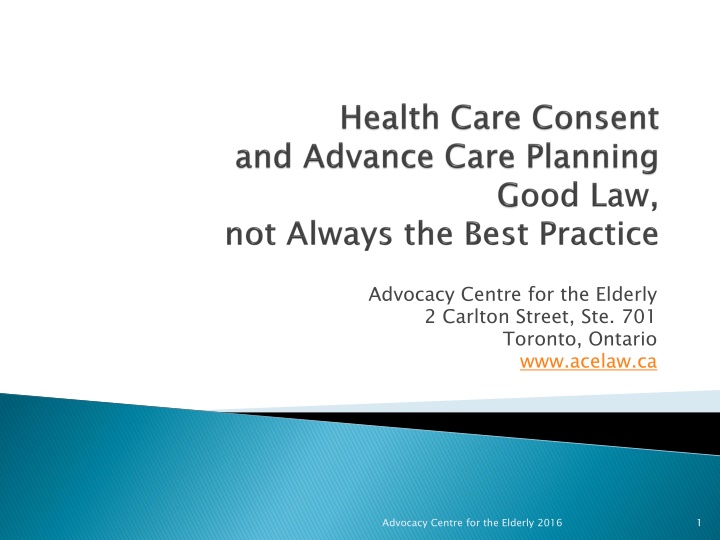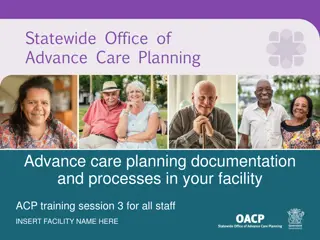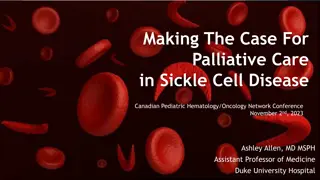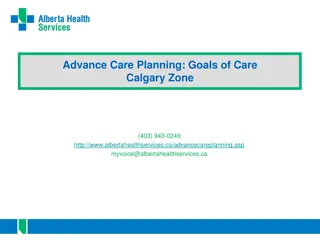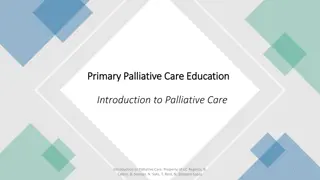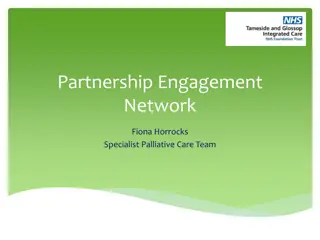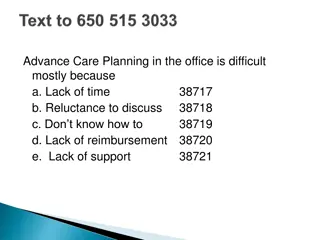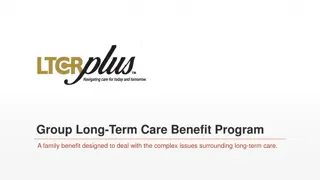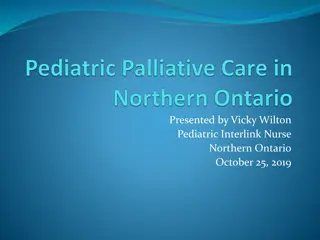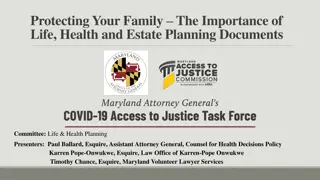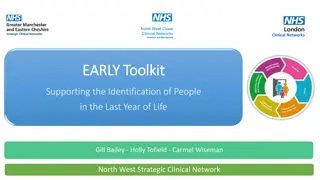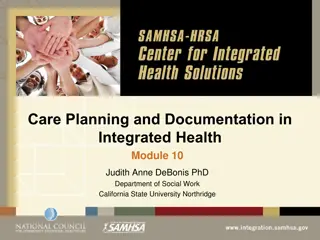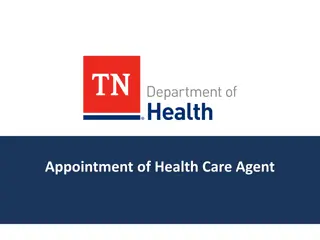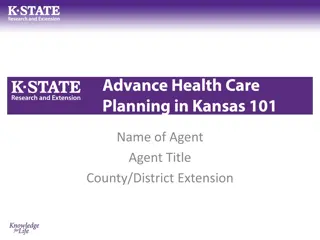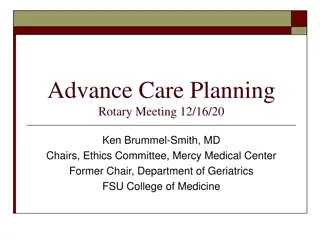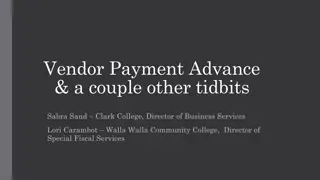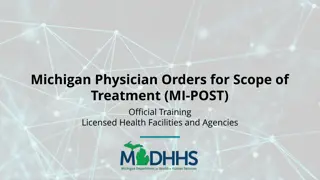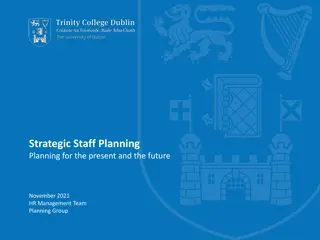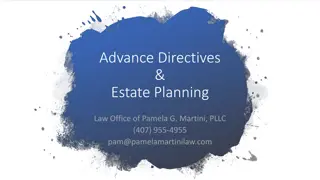Advance Care Planning
This presentation from the Advocacy Centre for the Elderly in Toronto, Ontario discusses legal information related to health care consent, advance care planning, and decision-making for individuals lacking mental capacity. It addresses common misconceptions and provides guidance on documenting treatment preferences through advance directives or living wills.
Download Presentation

Please find below an Image/Link to download the presentation.
The content on the website is provided AS IS for your information and personal use only. It may not be sold, licensed, or shared on other websites without obtaining consent from the author.If you encounter any issues during the download, it is possible that the publisher has removed the file from their server.
You are allowed to download the files provided on this website for personal or commercial use, subject to the condition that they are used lawfully. All files are the property of their respective owners.
The content on the website is provided AS IS for your information and personal use only. It may not be sold, licensed, or shared on other websites without obtaining consent from the author.
E N D
Presentation Transcript
Advocacy Centre for the Elderly 2 Carlton Street, Ste. 701 Toronto, Ontario www.acelaw.ca Advocacy Centre for the Elderly 2016 1
ACE Services Legal advice and representation Public legal education programs Law Reform and Legal Policy Activities E newsletter twice a year Contact steint@lao.on.ca www.acelaw.ca 2 Carlton Street, Suite 701 Toronto, ON M5B 1J3 416-598-2656 wahlj@lao.on.ca Judith A. Wahl Advocacy Centre for the Elderly 2016 2
This presentation contains legal INFORMATION for educational purposes and not legal advice If you need legal advice for a particular situation, please consult your own legal advisor Advocacy Centre for the Elderly 2016 3
Do YOU understand Health Care Consent? How Confidant are YOU about your knowledge of Advance Care Planning? Advocacy Centre for the Elderly 2016 4
For a person who lacks the mental capacity to make decisions, Advance Care Planning conversations can take place with substitute decision makers on behalf of the incapable person. True True or or False? False? 5 Advocacy Centre for the Elderly 2016
FALSE FALSE Advocacy Centre for the Elderly 2016 6
Preferences for treatments should be documented in either an advance directive or a living will. True True or or False? False? Advocacy Centre for the Elderly 2016 7
FALSE FALSE Advocacy Centre for the Elderly 2016 8
When a person appoints an Attorney for Personal Care only a lawyer has the authority to oversee the process. True True or or False? False? Advocacy Centre for the Elderly 2016 9
FALSE FALSE Advocacy Centre for the Elderly 2016 10
Wishes expressed verbally are less "usable" than wishes that are written, signed and witnessed. True True or or False? False? Advocacy Centre for the Elderly 2016 11
FALSE FALSE Advocacy Centre for the Elderly 2016 12
ACE prepared a report for the Law Commission of Ontario with the law firm of Dykeman Dewhirst O Brien LLP in 2014 on HCC and ACP. We reviewed the operationalization of health care consent and advance care planning by health practitioners and organizations in the province of Ontario. Our final report can be accessed at: http://lco-cdo.org/en/capacity-guardianship- commissioned-paper-ace-ddo Advocacy Centre for the Elderly 2016 13
Ontario law is different than the other jurisdictions we used as comparators. In some of the other Canadian provinces, a written advance directive may be equivalent to informed consent to treatment. In some other jurisdictions, written advance directives may be interpreted and applied directly by physicians. THIS IS NOT THE LAW IN ONTARIO. Advocacy Centre for the Elderly 2016 14
Many health care organizations were using legally incorrect forms and policies (including documents from other jurisdictions without adaptation for Ontario law). This causes confusion and doesn t help Health practitioners understand the requirement to get an informed consent at the time of treatment from a capable patient or the incapable patient s SDM EVEN IF Advance Care Planning Wishes exist in the chart Advocacy Centre for the Elderly 2016 15
Everyone talks about advance care planning, but no one talks about consent! Patients are often immediately asked to express future care wishes, with little or no context, and patients are rarely told how their statements will be used. Health practitioners should close the loop and emphasize obtaining informed consent. Advocacy Centre for the Elderly 2016 16
Health Care Consent What is consent? How do you have that conversation? When does a health professional need to get consent from before treatment? What happens if a patient is not mentally capable? Who can provide consent? What are health practitioners obligations when seeking consent from a substitute decision-maker Advance Care planning What is advance care planning under Ontario law? How do Health Care Consent and Advance Care Planning connect? Who takes direction from a Advance Care Planning wishes? How do you have that conversation about Advance Care Planning? Advocacy Centre for the Elderly 2016 17
Health Care Consent ? What does this mean to you? Advocacy Centre for the Elderly 2016 18
Health practitioners need to obtain INFORMED consent or refusal of consent to a treatment from the patient, if capable, before treating, except in an emergency If the patient is not capable, the consent is given by the patient s SDM Health care consent is an informed and contextualized DECISION. This is the same whether its treatment about end of life care or treatment under any other circumstances Advocacy Centre for the Elderly 2016 19
To determine whether the PATIENT is CAPABLE of giving or refusing consent to the treatment decision To determine WHO is the patient s RIGHT SDM if the patient is incapable To inform the treatment decision maker whether the Patient or the SDM- about the PATIENT S CONDITION and the possible TREATMENT OPTIONS Advocacy Centre for the Elderly 2016 20
When seeking consent, health practitioners) have a duty to COMMUNICATEwith patients (or the incapable patient s substitute decision-maker) about the patient s present condition and the available treatment options Information needed to be communicated includes info on the risks, benefits, side effects, alternatives to the treatment, and what happens if the treatment is refused Consent ALWAYS comes from a person, not a piece of paper - not from a patient s written advance care plan nor from patient s wishes noted in medical records Advocacy Centre for the Elderly 2016 21
Even if a patient has provided some form of Advance Care Plan to the health providers and expressed wishes about future care, those wishes should not be used to determine treatment options offered Wishes may have been expressed out of context without knowledge of how the patients condition has changed/ developed and without knowledge or understanding of possible treatment option - PATIENTS may CHANGE THEIR MINDS after getting all the INFO to make an informed consent Advocacy Centre for the Elderly 2016 22
Make sure patient / SDM understands what is the patient's PRESENT condition 1. Discuss treatment options and RISKS, BENEFITS, SIDE EFFECTS, ALTERNATIVES to the treatment, and what would happen if treatment refused 2. Personalize discussion to the patient by talking with patient about Goals of Care 3. GET INFORMED CONSENT to a treatment or Plan of treatment 4. Advocacy Centre for the Elderly 2016 23
HCCA, s. 11 1. Must relate to the treatment 2. Must be informed 3. Must be given voluntarily 4 Must not have been obtained through the treatment informed voluntarily misrepresentation or fraud misrepresentation or fraud Advocacy Centre for the Elderly 2016 24
The patient must receive information on the: Nature of the treatment Expected benefits of the treatment Material risks of the treatment Material side effects Alternative course of action Likely consequences of not having the treatment Advocacy Centre for the Elderly 2016 25
The right to informed consent is a requirement that cannot be waived by the patient. Even where the patient has completed an advance directive , the patient or their SDM must still give or refuse informed consent (except in an emergency). Advocacy Centre for the Elderly 2016 26
A patient can give an informed consent to a treatment that takes place or is withheld in the future if that treatment relates to the patient s PRESENT HEALTH CONDITION This is not Advance Care Planning, but is Consent Patients at end of life can CONSENT to No CPR/DNR and this is NOT advance care planning Advocacy Centre for the Elderly 2016 27
developed by one or more Health practitioners deals with one or more of health problems that a person has and may, in addition, deal with one or more of the health problems that the person is likely to have in the future given the person s current health condition, and provides for the administration to the person of various treatments or courses of treatment and may, in addition, provides for withholding or withdrawal of treatment in light of person s current health condition. BOTTOM LINE: PLANS OF TREATMENT MUST BE GROUNDED IN THE PATIENT S PRESENT HEALTH CONDITION. This is NOT a Preconsent. This is NOT an advance care plan. Both Patients and SDMs ( where appropriate) may CONSENT to Plans of Treatment Advocacy Centre for the Elderly 2016 28
An informed consent is a DECISION by a patient or SDM of an incapable patient based on knowledge of the patient s present condition and treatment options It is a DECISION within a CONTEXT Care Planning (not a legal term) - trying treatment options, goal planning, setting goals of care etc. is part of the consent process and is NOT advance care planning Advocacy Centre for the Elderly 2016 29
How are patients / their SDMs are asked about Code Status when in hospitals or other health facilities before this is listed in the chart? Is an INFORMED CONSENT being obtained to the Code status ? Code status is NOTabout Goals of Care its about INFORMED CONSENT to CPR or No CPR Code status is NOT advance care planning Advocacy Centre for the Elderly 2016 30
In an EMERGENCY, health care providers do not need consent in order to treat. But, they must follow any known WISHES of the patient in respect to the proposed treatment. Advocacy Centre for the Elderly 2016 31
Meaning of emergency S.25(1) there is an emergency if the person for whom the treatment is proposed is apparently experiencing severe suffering or is at risk, if the treatment is not administered promptly, of sustaining serious bodily harm. Advocacy Centre for the Elderly 2016 32
Advance Care Planning?? What does this mean to you? What does this mean to you? Advocacy Centre for the Elderly 2016 33
1. IDENTIFICATION of the capable patients futureSubstitute Decision-Maker (SDM), by either a) confirming that the patient is satisfied with their default/ automatic Substitute Decision-Maker in the hierarchy list that is in the Health Care Consent Act OR b) Patients choosing someone else to act as SDM by preparing a Power of Attorney for Personal Care (a formal written document). 2. WISHES, VALUES, AND BELIEFS discussing with the capable patient about his/her wishes, values and beliefs, and more generally how he/she would like to be cared for in the event of incapacity to give or refuse consent. These are used as a GUIDE for the SDMs NOT the Health practitioners Advocacy Centre for the Elderly 2016 34
Only the PATIENT when capable can prepare a POA Personal Care Only the Patient may express his or her own wishes about future care and treatment SDMs cannot do Advance Care Planning and ONLY provide consent or refuse consent to treatment on behalf of a patient incapable for treatment Advocacy Centre for the Elderly 2016 35
May ONLY be done by PATIENTS not SDMs CONFIRMATION or CHOICE of SDM by the PATIENT Communication of the Patients WISHES, Values, Beliefs that they want considered by the SDM when the SDM makes a decisions about treatment for the patient in the future Advocacy Centre for the Elderly 2016 36
Advance Care Planning is a USEFUL and IMPORTANT process BUT Health Practitioners NEED to get an Informed Consent before treatment THAT is Patient Centred Care Advocacy Centre for the Elderly 2016 37
Wishes do not need to be expressed in writing. Wishes may be expressed in any form at any time when the patient is mentally capable (Oral, written, communicated by other means) Later wishes, however communicated, expressed while capable prevail over earlier wishes. A recent capable oral wish will trump an older capable written wish. This is true even if the previous wishes were in writing and the later wishes are oral Advocacy Centre for the Elderly 2016 38
Advance Care Planning does not need to be about specific treatments that a person would want to not want It is very difficult to anticipate what treatments one would want for themselves as people don t know how their health condition will progress or what the effect of particular treatments would be ACP Wishes and explanations of a person s values and beliefs may help the SDM make better decisions for the patient as these wishes help the SDM understand: who the patient is, how they make choices for themselves, what they think is important to themselves what influences their decision making Advocacy Centre for the Elderly 2016 39
Advance care planning wishes should not be used to limit/ restrict treatment options without first talking to the patient/ SDM of the incapable patient about the patient s PRESENT condition Why? Because wishes may have been expressed out of context, without information of options, in a summary way, but with context , patient is NOW able to give an informed DECISION (consent) and SDM is better able to apply and interpret previous wishes to then make a DECISION (Consent) Advocacy Centre for the Elderly 2016 40
Any Tools used for Consent and ACP that START asking Patients for their WISHES about care without: First discussing with the patient their PRESENT health condition Explaining HOW the wishes will be used Explaining that the Health Practitioners do NOT follow any wishes except in an emergency Explaining that wishes are not Consents and that before any treatments are provided, the patient will have the chance to know what are their treatment options and that they have the right get information to make an INFORMED DECISION ARE NOT GOOD TOOLS!! Advocacy Centre for the Elderly 2016 41
ACP is NOT about DECISIONS ACP is about WISHES, VALUES, BELIEFS to help the SDM to make DECISIONS about treatment and give or refuse consent Advocacy Centre for the Elderly 2016 42
May someone other than the health care practitioner treating the patient, or a member of that health team, engage in discussions about advance care planning? If yes, is there anything that person should NOT be discussing? As wishes (statements that are not informed consents) about treatment may be followed directly in an emergency by health practitioners, does this influence how that part of advance care planning should be done? As the wishes/ values/ beliefs are primarily communications to the future SDM how does that affect how ACP should be done? Advocacy Centre for the Elderly 2016 43
Advance Directive? WHAT is this??? Living will? What is this???? Advance Directive? WHAT is this??? Living will? What is this???? Level of Care Directive? What is this???? Level of Care Directive? What is this???? THESE ARE NOT ONTARIO TERMS and Should NOT be used THESE ARE NOT ONTARIO TERMS and Should NOT be used Advocacy Centre for the Elderly 2016 44
The terms advance directive and living will do NOT appear in Ontario Law. This terminology should NOT be used in documents/ records Instead use terminology such as advance care planning or capable wishes or wishes, values, beliefs The Health Care Consent Actonly refers to the word wishes . If a document says it is an advance directive or a living will , under Ontario law it is just an expression of wishes, to be interpreted by the SDM alongside other oral and written expressions of wishes. BUT NOTE - Only a formal written Power of Attorney for Personal Care gives authority to name an SDM Advocacy Centre for the Elderly 2016 45
The risk: You think you have consent when you don t The risk: You don t think you have consent when you do Advance Care Plan Future health condition the implications for which may not be easily known to the person Advance Care Plan Consent to a Treatment or Plan of Treatment Current health condition, where the Implications are known Consent Health Care Consent and Advance Care 46 46 Advocacy Centre for the Elderly Planning - 2014 2016 46
Need to talk to patients or appropriate SDMs to get INFORMED consent to a treatment or PLAN of treatment THESE CONVERSATIONS are fundamental before providing treatment both in law and ethics Advocacy Centre for the Elderly 2016 47
Under Ontario law, advance care planning is part of the law of informed consent. Patient wishes are interpreted by the SDM not the health practitioner. Advance Care Planning discussions about wishes, values, and beliefs should help the SDM make better decisions for the patient when the patient may be incapable Advocacy Centre for the Elderly 2016 48
Are SDMs the same as Next of Kin? Are all SDMs attorneys in Powers of Attorney for Personal Care? If the patient has not legally chosen an SDM, May the health practitioners decide what treatments the patient gets? Advocacy Centre for the Elderly 2016 50
